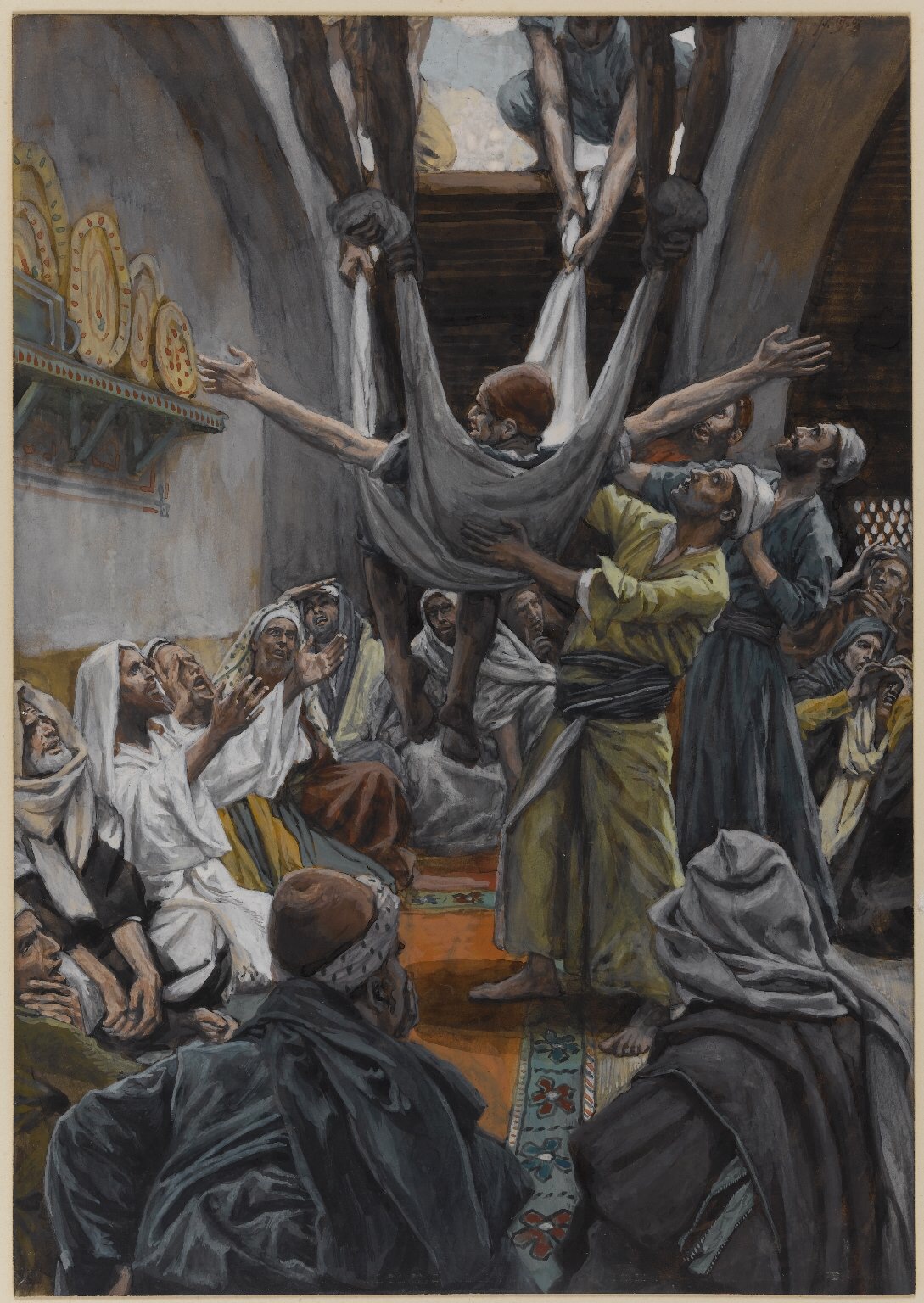When Jesus returned to Capernaum after some days,
—Mk 2:1-12
it became known that he was at home.
Many gathered together so that there was no longer room for them,
not even around the door,
and he preached the word to them.
They came bringing to him a paralytic carried by four men.
Unable to get near Jesus because of the crowd,
they opened up the roof above him.
After they had broken through,
they let down the mat on which the paralytic was lying.
When Jesus saw their faith, he said to him,
“Child, your sins are forgiven.”
Now some of the scribes were sitting there asking themselves,
“Why does this man speak that way? He is blaspheming.
Who but God alone can forgive sins?”
Jesus immediately knew in his mind what
they were thinking to themselves,
so he said, “Why are you thinking such things in your hearts?
Which is easier, to say to the paralytic,
‘Your sins are forgiven,’
or to say, ‘Rise, pick up your mat and walk’?
But that you may know
that the Son of Man has authority to forgive sins on earth”
–he said to the paralytic,
“I say to you, rise, pick up your mat, and go home.”
He rose, picked up his mat at once,
and went away in the sight of everyone.
They were all astounded
and glorified God, saying, “We have never seen anything like this.”
Hello friends,
In today’s Gospel we’re once again given the story of the healing of the paralytic. I touched upon this back in December, but so as not to rehash entirely what I said last time, I’ll focus on some different things today.
When I last touched upon this Gospel reading, I highlighted the obstinance of the Pharisees, the unceasing faith of the paralytic, and the need for community as we are all the Body of Christ.
Notable is that Jesus first forgives the sins of the paralytic, but then afterwards He heals his paralysis.
Of course Our Lord and Savior knew the paralytic needed interior healing (his sins forgiven) before physical healing (his paralysis). A number of years ago, I went to one of speaker Matthew Kelly’s talks. You probably know him as the founder of the Dynamic Catholic institute, and he’s well known for writing Rediscovering Catholicism. Kelly referred to Jesus as “the divine psychologist” when He instituted the sacrament of confession and, with it, our Sacred Tradition of Aposotolic Succession. The document Dei Verbum from The Second Vatican Council elaborates on this. (Specifically, see n. 7–10 on “Handing on Divine Revelation.”)
What do I mean by all this? This is certainly not one of those long-winded rhetorical detours I’ve become infamous for. Many of my friends and acquaintances over the years know what I’m talking about. “Ryan, you’re going off topic! Get to the point!” What I mean is that in the Catholic faith we acknowledge woundedness and brokenness are real. We acknowledge the sacrament of reconciliation is real. And indeed, maybe Kelly remarking that Jesus is “the divine psychologist” isn’t such a far-fetched idea when we consider the healing of the paralytic. Indeed, in both depictions of the healing of the paralytic in Luke and Mark, Jesus heals the paralytic internally before he heals his physical ailment.
Many years ago, when I first began seeking assistance for major depression and generalized anxiety disorder, I began navigating a deeply bureaucratic, and at times, callous medical and psychiatric system. A number of doctors I saw simply saw “the solution” for my diagnosis as, “Here, take this. Once a day. That doesn’t work? Ok, come back and you’ll take something else. You won’t need anything else.” It was awfully dismissive behavior. But in life, it mirrors a lot of things. We often want “easy” or “fast” solutions. Mind you, there is nothing wrong with antidepressants! They absolutely work! But that’s not my larger point.
One reason why I was diagnosed with major depression in the first place was my own brokenness after struggling for years with so many different things—one of them growing up in a broken family and growing up without a father. I carried feelings of resentment and abandonment over the years, and some of it unintentionally spilled over as resentment towards not just my earthly father but my Heavenly one. I eventually began speaking to a good Catholic therapist. I frequented Mass and confession more often shortly afterwards.
The solution—for me—was clearly not just to take antidepressants. More needed to be done as well. (I am not giving psychiatric advice.) Personally speaking, I needed interior healing after not addressing years of brokenness. In Matthew Kelly’s words, I needed “the divine psychologist.” Jesus, because He has the divine intellect, saw that whatever was plaguing the paralytic, required interior healing first. There was clearly something in the paralytic’s past that was either not clearly resolved or that needed forgiveness first and foremost. In a sense, Jesus was the “divine psychologist” who cleaned the rubbish off this man’s soul that had built up over the years. This immediately prepared the paralytic to once again walk. He certainly helped clean the rubbish off my soul.
I remember speaking to a Dominican nun several years ago when I was in Poland for World Youth Day 2016. This sister elaborated that not going to confession, not seeking interior healing, being in a state of mortal sin, was equivalent to a child standing before a mirror with their clothes all muddy, with even the glass of the mirror dirty. You’ve probably heard the analogy of going to confession as akin to taking a shower. The larger point is they all work. We’ve all had rubbish or woundedness weighing down on us, and we have Jesus, the Church, and the sacraments for a reason!
Jesus Himself says, “Come and see,” in the Gospel of John. Jesus will never forcibly take anything from you by force; He is always waiting for you to open up to Him. It’s perhaps no surprise that the Church chose “Jesus Christ, the same yesterday, today, and forever” as the motto for the Jubilee 2000. Because God exists outside of time, and because yesterday is the same as today for Jesus, He can always forgive us and heal us of our brokenness. If we can unite our sufferings to Jesus, it’s even better.
Jesus is always awaiting a “new deed” in your life anytime you turn to Him. Even in Mel Gibson’s The Passion of the Christ, Jesus tells Our Lady as He is carrying the cross, even in enormous indescribable pain, “See, Mother, I make all things new.” (Yes, I know it’s a slight alteration of what is found in Revelation 21. It still works.) Jesus, indeed, makes “things new.” He made it new for the paralytic. He will make it new for you.
Think of all the times Jesus went to sinners and removed the rubbish from them in the Gospels. The larger point is in this pandemic age we live in, where we may think Christ has abandoned us, is that He hasn’t. Go to Him. Go to Him for healing. Go to Him and seek the sacrament of reconciliation. It is not the priest you meet in confession, but Our Lord and Savior. I’m sure once you seek Jesus, you’ll be able to rise and walk as the paralytic did.





